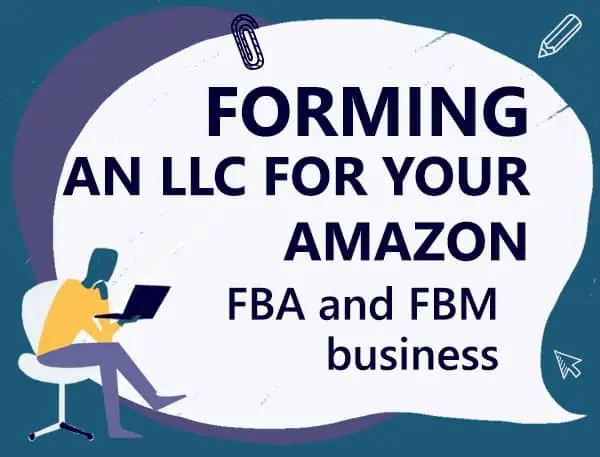
For many people, starting selling products on Amazon can begin as a form of hobby, or just a little experiment to see how their product fares.
For others, it is a serious decision from the outset. Whatever the reasoning behind the decision to take the first steps as an Amazon seller though, no one knows where those first steps may eventually lead.
Things could take off brilliantly and the whole endeavor is fun – but as a business grows, so does the potential for problems further down the road.
It’s better to take preventative action ahead of time than be caught out later, which is why it can be a very good idea to incorporate your Amazon seller’s business early on.
What is an LLC?
An LLC is a type of business structure that is recognized lawfully by the state. LLCs are a highly favored business build, for several reasons.
They’re considered to be separate from their owners (unlike sole proprietorships and partnerships).
Generally, the owners of an LLC – more commonly referred to as members – are not held directly liable should the firm run into any legal issues or problems relating to company debt.
This means that only the business assets, not any personal assets of the company members, could be seized in lieu of money owed. An LLC is also a pass-through entity when it comes to dealings with the IRS.
Any profits made by an LLC are passed directly to its members. Any revenue that happens to be generated by the business will be included within the members’ own personal tax returns.
As opposed to corporations, LLCs are bound by less rigid stipulations and fewer formalities.
A corporation involves more paperwork, is required to have a board of directors and to hold annual meetings, and so on: an LLC is not. This ‘relaxed’ approach can provide a friendlier feel which many people will favor.
Is an LLC Required to Conduct Business on Amazon?
There is nothing legally binding to selling on Amazon, which makes an LLC essential in order to conduct transactions on Amazon.
However, it can very much be in a seller’s best interests to create an LLC in order to conduct business activities within the Amazon marketplace.
From the perspective of potential customers, any item being sold via an LLC looks a lot more professional and legitimate than one that is advertised for sale by just John or Jane Doe.
Knowing that a company is officially recognized and approved is reassuring and can go a long way in the minds of prospective customers.
From the perspective of a new seller on Amazon, you may be starting off small, but what if your enterprise escalates and before you know it, your business is booming? What then, if a lawsuit is filed against you?
Or for some unforeseen reason, the business suddenly tanks after a prosperous period and now your company owes money?
If you create an LLC, it will provide legal protection in the event of action being taken out against your business, shielding its owners and their personal assets. LLCs provide a barrier between business and owner that sole proprietorships and partnerships do not.
How to Create an LLC for Your Amazon Business
Decide on Your Business Name
Firstly, you will need a unique name for your new enterprise. Be sure to do your research. Via your department of state’s official website, you should be able to perform a business name search.
You’ll need to ensure the name you wish to use has not already been registered. It’s equally as important to ensure that the name is not too similar to a name already registered.
Making sure your name is unique will prevent your business from being confused with another company.
Note: When creating your name, you have to end it with a suffix such as LLC or Limited Liability Company.
Assign a Registered Agent
It’s a general rule that a registered agent must be appointed to a business. A registered agent can be an individual person or can be a business entity in its own right.
The registered agent’s function is to receive – and act on – communications between the state and LLC owners. They are, in essence, a middle-man of sorts, and an essential one.
They will handle all time-sensitive documents so that you don’t have to worry about them. Receiving and sending important paperwork is the job of the registered agent.
This is to ensure that paperwork is kept up to date and that all state compliances are met so as to keep the LLC in good standing with the state.
The registered agent – be it an individual or registered agent company – must be a permanent resident with a physical address within the state in which your LLC is registered.
Draft an Operating Agreement
Operating Agreements are not usually mandatory documents. However, though they may not be required by the state, they can be invaluable to the set-up of your business.
It’s widely considered to be a very good idea for an operating agreement to be created when an LLC has two members or more.
The purpose of this document is to outline the intended operational conduct of the business and the manner in which the business is to be run, both on a day-to-day basis and in the event of changes further down the line.
Changes could involve a member wishing to leave the company or a new member being brought in. It also includes decisions regarding the managerial structure of the company.
With that in mind, plus the sharing of profits the company may generate, you can see why operating agreements are a very good idea.
With one of these drawn up, it can go a long way to settling issues later on in the event of a dispute between members.
File the Articles of Organization
The next step is to file the Articles of Organization with the state.
These Articles are sometimes also known as a ‘Certificate of Organization’ or ‘Certificate of Formation’, depending upon the state within which you will be registering your company.
Filing this document can usually be done via the website of the Secretary of State for your location.
Either online or printed out and delivered to the Department of State, these documents require all the essential but basic information of your company such as:
- The name of your business;
- The name of your registered agent;
- The address of your registered agent;
- The business purpose of your company;
- Your name and home address.
- Get your Employer Identification Number
Drawing on research from Biznovice, if you are going into business on your own, obtaining an Employer Identification Number is not a prerequisite – though it is still a good idea.
It is, however, compulsory if you are to open a business bank account and/or hire employees. An EIN is a federal tax ID number. Having a separate business bank account for your company is pure common sense.
This way, profits, and outgoings are all handled within one specific account. Merging business finances with personal finances is known as commingling and is a bad idea.
An EIN number can be used to open a business bank account instead of your own personal social security number and is a good idea.
Final Thoughts
However serious or casual you are about selling on Amazon, there is little doubt that it makes more sense to form an LLC for your activities than not to. It may seem like a lot of paperwork at first, but LLCs are simple to set up.
If you are worried about making mistakes in the formation process, there are a wealth of LLC Formation Service companies on the market to assist new entrepreneurs and ensure that all your bases are covered.
Selling on Amazon via an LLC will give you and your company extra credibility, as well as protection in the event of problems later on.
Success may be just around the corner – so it is better to incorporate sooner than later if you are serious about being a top seller on Amazon.
Author bio:
Jean Wilson Murray
A legal expert and co-founder of Best LLC Services and has been helping aspiring entrepreneurs start their own companies for seven years already
Comments
Related Posts

10 Profitable Product Categories for Amazon Affiliates 2025
What you’ll learn Amazon is a favorite for experienced and…

Unlock the Secret to a Profitable Automated Amazon Store: How to Build a Hands-Free Income Stream
Ever dreamed of running a profitable Amazon business while sipping…

Master Amazon New Restricted Keywords: A Seller’s Guide to Success
Changes to Amazon’s restricted keywords list have taken a lot…







Leave a Reply